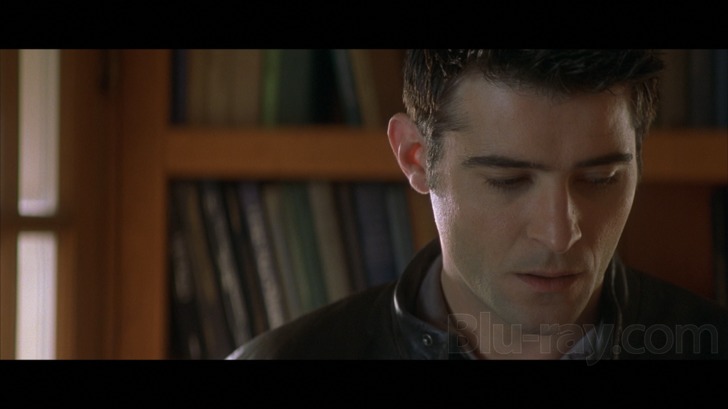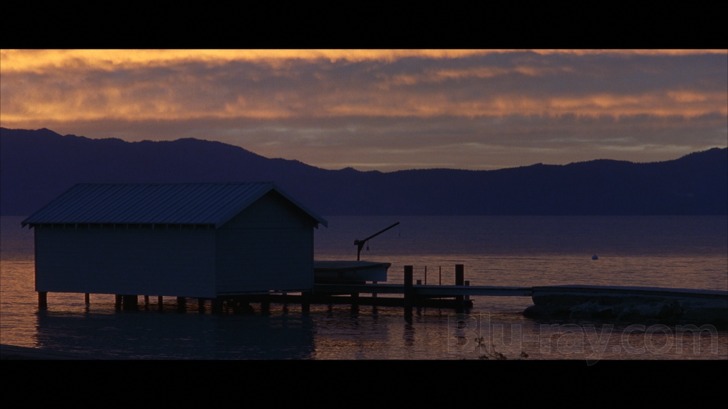The Deep End Blu-ray Movie
HomeThe Deep End Blu-ray Movie 
20th Century Fox | 2001 | 101 min | Rated R | May 06, 2014
Movie rating
6.7 | / 10 |
Blu-ray rating
| Users | 0.0 | |
| Reviewer | 3.5 | |
| Overall | 3.5 |
Overview
The Deep End (2001)
A woman spirals out of control while trying to keep her son from being found guilty in a murder investigation.
Starring: Tilda Swinton, Goran Visnjic, Jonathan Tucker, Peter Donat, Josh LucasDirector: David Siegel (III), Scott McGehee
| Crime | Uncertain |
| Drama | Uncertain |
| Mystery | Uncertain |
Specifications
Video
Video codec: MPEG-4 AVC
Video resolution: 1080p
Aspect ratio: 2.34:1
Original aspect ratio: 2.39:1
Audio
English: DTS-HD Master Audio 5.1 (48kHz, 24-bit)
Spanish: Dolby Digital 2.0
French: Dolby Digital 5.1 (448 kbps)
Subtitles
English SDH, Spanish, Danish, Finnish, Norwegian, Swedish
Discs
50GB Blu-ray Disc
Single disc (1 BD)
Playback
Region A (B, C untested)
Review
Rating summary
| Movie | 3.5 | |
| Video | 3.5 | |
| Audio | 4.0 | |
| Extras | 2.5 | |
| Overall | 3.5 |
The Deep End Blu-ray Movie Review
A helicopter parent encounters some serious turbulence.
Reviewed by Jeffrey Kauffman May 6, 2014Any of you who admit to so-called “helicopter parenting” might want to view The Deep End as either a cautionary tale or proof positive that your preferred approach to child rearing is the only sensible alternative out there. This is a film where members of a family barely speak to each other, but where an involved mother finds herself ensconced in an ever murkier web of death, alleged murder and ultimately blackmail, while “simply” attempting to keep her errant teenage son out of harm’s way. Cineastes may quickly realize that the basic outlines of The Deep End’s plot were told long ago and in a slightly different way in Max Ophuls’ 1949 film noir The Reckless Moment, and indeed The Deep End shares the same source material, Elizabeth Sanxay Holding’s story “The Blank Wall”. The Deep End gives one major character a gender (and sexual orientation) change, but otherwise, the two films share a certain increasing desperation surrounding the efforts of a well meaning mother who believes that her child has killed an already dangerous lover. A series of cascading dominoes ensues, one which The Deep End co-writers (and co-directors) Scott McGehee and David Siegel exploit by having mom Margaret Hall (Tilda Swinton) and 17 year old son Beau (Jonathan Tucker) resolutely resist ever really sitting down and talking to each other. Part of this can be attributed to Beau’s typically sullen teenaged demeanor, but Siegel and McGehee also seem to want to posit a family matriarch who is more about action than mere words.

A pre-credits sequence introduces us to preternaturally worried mom Margaret Hall, who arrives at a nondescript looking door at what appears to be an abandoned movie theater in what might be deemed the wrong side of the tracks in Reno, Nevada. After buzzing repeatedly and insistently at the door, she’s finally let inside, where it becomes apparent that the location is actually a gay bar. Margaret asks to meet with club’s owner Darby Reese (Josh Lucas), who it turns out has been seeing her 17 year old son, Beau. Margaret tells Reese to stay away from her son, at which point a huge flare of light expands ominously, as if Margaret had unwittingly sparked some kind of conflagration—which, it turns out, she has, metaphorically at least.
After the credits, we’re introduced to Margaret’s family life on the banks of Lake Tahoe, where she lives with her three kids. Aside from Beau (who is momentarily missing when she returns home, causing more worry), there’s teenage daughter Paige (Tamara Hope) and younger son Dylan (Jordon Dorrance), along with her somewhat addlepated father- in-law Jack (Peter Donat). Margaret’s husband is a Navy man away on assignment, but it seems like Margaret has everything under control—if only barely. Once Beau returns home, there’s a fitful attempt at a conversation, where Margaret gently prods about any incipient homosexual leanings, an inquiry which Beau shuts down angrily. Margaret seems poised to accept any information Beau is willing to share, but she’s also protective of her son’s future—he is a promising trumpet player with a college scholarship awaiting him—and she’s absolutely convinced that Reese is bad news.
That night, it seems that Margaret’s worst fears are indeed accurate when Reese shows up—perhaps drunk—coaxing Beau outside and confessing that Margaret’s earlier revelation to Beau that Reese had offered to “give up” the boy for several thousand dollars is true. Beau is obviously hurt and outraged in equal measure, and when Reese tries to put the moves on the kid despite the roiling emotions of the moment, Beau pushes him away, igniting a huge melée in the Hall’s tony boathouse at the edge of the lake. Several pretty serious blows are exchanged, with Beau stumbling away from the fracas back toward the house while a seriously discombobulated Reese attempts to catch his breath by leaning against a railing on the lakeside pier—a railing which promptly breaks, catapulting Reese to a pretty ugly death on the beach below.
That sets up the gist of the thriller elements of The Deep End. Margaret of course finds the corpse the next morning and jumps to the understandable conclusion that Beau has killed his erstwhile lover. Margaret, dutiful protective mother that she is, takes matters into her own capable hands, bundling the body up, hoisting it into the family boat and then taking it to a rock strewn bay in Lake Tahoe where she unceremoniously dumps it. Things seem to be taken care of, if only temporarily, until Margaret realizes that Reese had driven to the Hall residence and his car is still parked out in front of the house. That necessitates a return visit to the body to retrieve the car keys, in one of the film’s more artful sequences.
Things begin to get seriously convoluted and perhaps a bit less credible when a slick blackmailer named Alek Spera (Goran Visnjic) shows up with a sex tape of Beau and Reese, demanding payment. Soon enough Reese’s body is found and (in a somewhat unexplained development) his death is ruled a homicide, making Beau the prime target, especially if Spera’s tape becomes public. A cat and mouse game ensues, with Margaret attempting to keep it all together. Beau, meanwhile, has of course come to the conclusion that it was Margaret who killed Reese, and the two circle each other warily, without ever taking the time to simply sit down and talk to each other.
As far as thrillers like this go, The Deep End is largely successful in building a fair degree of suspense as Margaret’s immaculately put together world starts to unravel. But McGehee and Siegel also wander into areas of high improbability as the story unfolds (at least some of which can be traced to the source material). Once Spera arrives, things are increasingly ominous, but a few too many coincidences and one hugely advantageous development right at the climax seem to deflate the tension that has been so well constructed up to that point. But it’s here that the co- writers and co-directors perhaps tip their hand that making a neo-noir was not their only goal. The Deep End is perhaps just as much a truculent depiction of the lengths a concerned parent will go to in order to give their kid a leg up in the world—a leg hopefully unencumbered by a prisoner’s ankle shackle.
The Deep End Blu-ray Movie, Video Quality 

The Deep End is presented on Blu-ray courtesy of 20th Century Fox Home Entertainment with an AVC encoded 1080p transfer in 2.34:1. There are some interesting palette choices going on at various key moments in the film, and things like the teal sheen that colors the sequence where Margaret finds Reese's body pop subtly but vividly in high definition. While sharpness is generally quite good, at least some of that acuity may have been achieved through digital means, as there are admittedly minor but still noticeable halos on objects, especially in some of the outdoor footage. Several key dark sequences are littered with slight but visible compression artifacts. Fine detail is quite commendable throughout the presentation, aided by consistent contrast and good black levels. Colors are also very accurate looking and nicely saturated. Overall, this is a solid if unspectacular looking high definition presentation.
The Deep End Blu-ray Movie, Audio Quality 

The Deep End's lossless DTS-HD Master Audio 5.1 mix has a couple of standout sequences, notably a couple of scenes involving Margaret and the family boat, where surround activity is outstanding and there is some smart placement of various foley effects. The bulk of the film is quieter dialogue moments, despite the fact that Margaret and Beau never get much out in the open. That dialogue comes through cleanly and clearly, and the track boasts nice fidelity, with no problems whatsoever.
The Deep End Blu-ray Movie, Special Features and Extras 

- "The Anatomy of a Scene" Sundance Channel (480i; 24:07) actually looks at a few moments in the film, but concentrates on an integral scene with Margaret and Spera.
- Featurette (480i; 2:36) is a short EPK about the film that is about as generic as its title.
- Commentary by David Siegel and Scott McGehee reveals the easy rapport these two have with each other. There's some technical information here regarding the location shoot, but a lot of what is most interesting here is how they see the characters and why this film really shouldn't be thought of solely as a thriller.
- Theatrical Trailer (480i; 2:17)
- TV Spot "Review" (480i; 00:32)
The Deep End Blu-ray Movie, Overall Score and Recommendation 

The Deep End has a nice sense of just barely tamped down chaos threatening to erupt at any given moment, but it starts to lose steam once the blackmailer shows up and the film starts to wobble into melodrama and over the top histrionics. Swinton is outstanding as a mother with a fierce desire to keep everything under control, even when fate keeps snatching order from her grasping fingertips. There are some very minor things to be aware of with regard to the video quality of this release, but despite those, The Deep End comes Recommended.
Similar titles
Similar titles you might also like

Beast
2017

Victim
1961

A Bigger Splash
2015

Gone Girl
2014

The Magdalene Sisters
2002

The Square
2008

Black Swan
2010

The Postman Always Rings Twice
1981

Prime Suspect 3
1993

The Midnight Man
1974

Ripper Street: Season Four
2015

Equus
1977

Perry Mason: The Complete First Season
2020

Nightmare Alley 4K
B&W Extended Director's Cut and Theatrical Cut
2021

Sweet Bird of Youth
Warner Archive Collection
1962

The Night Of
2016

Closet Monster
2015

Eastern Promises
4K Restoration
2007

Searching
2018

Red Riding: The Year of Our Lord 1974
2009